Originally published on SoundStage! Xperience
Pryma 0|1 measurements can be found by clicking this link.
An ideal world would be meritocratic and egalitarian. Appearance wouldn’t matter. What truly counted would be what was inside each of us. Somewhere in the mooted multiverse such a reality probably exists, but it’s not the one we currently inhabit. Here, not only does one’s physical appearance matter, it’s been suggested that more good-looking people will, all else being equal, be perceived as more intelligent, friendly, and competent than the less good-looking. In fact, studies have shown that, on average, the better-looking get hired and promoted more often, and are paid more. Whether that’s fair or unfair, it might behoove me and you to get into better shape, shave regularly, and wear clothes that actually fit.
On that last front, out go the ill-fitting khaki pants, the shapeless Oxford shirts, the suit that’s “tailored” in name only. Think of it more as an opportunity than an obligation: instead of being shackled by society’s expectations, you’re updating your wardrobe to best express the modern you. And that’s important -- the goal isn’t to dress younger or cooler; instead, it’s something of an identity alignment issue. But these days, a change of clothes isn’t enough. It’s with accessories that each of us can tell the world that he or she is a special snowflake, one pair of retro eyeglasses at a time.
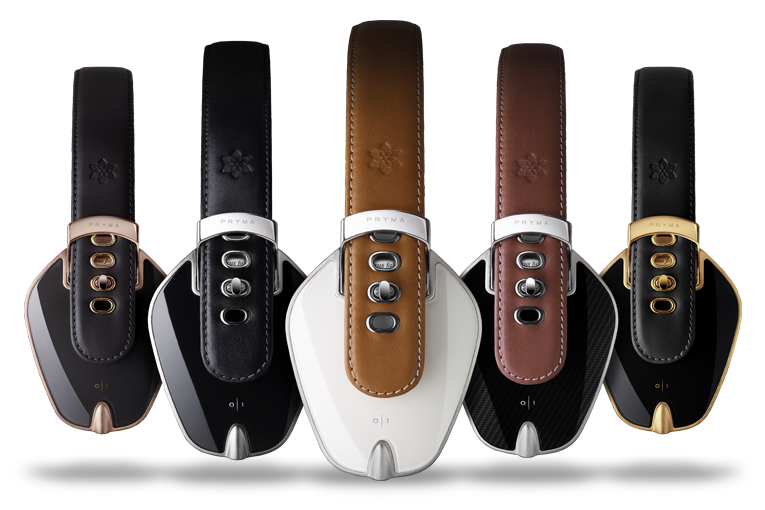
Luckily, high fashion has now wriggled its way into the headphone scene, with one company’s machinations of outfitting you and me with handmade, imported stereophonic headwear very much a reality.
Identity
Pryma is a recently created subsidiary of World of McIntosh (WOM), the company that owns such storied audiophile brands as Audio Research, McIntosh Labs, Sonus Faber, and Wadia Digital. It was important to the folks at WOM that their first headphone model be a fashion-forward design, and while Sonus Faber is particularly known for its gorgeous, handmade loudspeakers, it’s not necessarily known in fashion circles. “The idea of a headphone was ‘in the air’ for years,” Livio Cucuzza, WOM’s Chief Design Officer, wrote to me via e-mail, “but we didn’t want to create just ‘another’ headphone. We were searching for something more.”
The idea was simple: Use Sonus Faber’s manufacturing abilities and design aesthetic to create genuinely beautiful, lust-worthy headphones. Cucuzza & Co. went about this in a distinctly nonaudiophile manner. Paolo Tezzon, Sonus Faber’s manager of R&D, was responsible for handling the Pryma 0|1’s acoustical design. “We weren’t searching for a sound which is 100% natural or neutral,” he explained to me. “The 0|1 isn’t an audiophile product. It’s purely a lifestyle product.” This admission will be heretical to audiophiles, but rest assured: The Pryma0|1 s are not merely heavy-handed chintz, sonic or otherwise.
I had only to glance at the 0|1s’ box to see evidence of Pryma’s attention to detail. On the grippy black cardboard is embossed the company logo, and opening the magnetically attached flap reveals two cleverly designed compartments: in one, the ’phones with their headband; in the other, the cables and materials. The marketing blather printed on the latter wistfully concludes, “Your style can be seen. And now it can be heard.” Unlike with any other headphones I’ve reviewed, the leaflet packed with the Prymas lists the quality of the materials rather than such technical specifications as frequency response. The sense of occasion is convincing -- the packaging alone makes most competing products look like geeky toys.
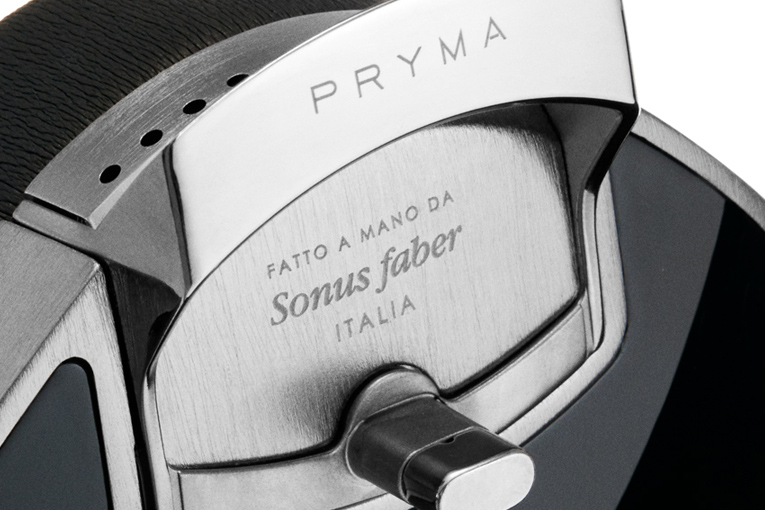
The experience continued as I assembled the Pryma 0|1s, whose headband and earcups work on the principle of, respectively, a belt and buckles. I slid one end of the leather headband through the buckle of one circumaural earcup, pushed the earcup’s nickel-plated tab through one of the four eyelets on that side of the band, and turned said tab 90 degrees to lock the earcup in place. All in all, the 0|1s comprise a sumptuous, gorgeous object that’s heavy on class and light on bling.
The 0|1s’ modular design makes it possible to buy one of five combinations of colors of earcups and headband. Coffee & Cream is the loudest: solid-white earcups, a headband in light tan, and silver buckle, eyelets, and earcup rim. Pure Black is the most conservative: all-black earcups and band with silver accents. Heavy Gold is identical to Pure Black, but with accents of gold, not silver. Rose Gold & Grey has gray earcups, a gray headband, and rose-gold accents. Each of these color combinations costs $499 USD. My review samples came in the fifth flavor, Carbon Marsala ($549): red headband, and earcups finished in lacquered carbon fiber. Additionally, Pryma sells the headband separately in each of the five colors ($89), so that buyers can tailor their 0|1s however they like.
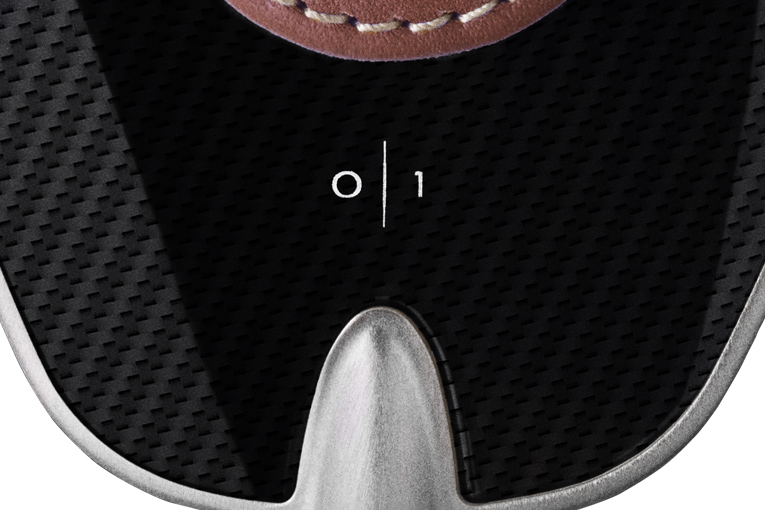
The look and feel of Pryma’s first-ever product are superb. Cucuzza assured me that the headband is made of the same top-quality leather used in high-end fashion. The earcups are, somewhat surprisingly, covered in hypoallergenic leatherette -- i.e., plastic -- but plastic so soft and supple that I doubt you’d ever suspect it. (I didn’t find out until I read the list of materials.) The shell of each earcup is forged from lightweight aluminum, with a fingerprint-proof nickel coating, and nine small holes along the top of the rim that act as Helmholtz resonators. These are akin to a reflex port on a speaker, but operate on different underlying acoustical principles. The buckle is made of copper and beryllium, while the underside of the headband is lined in a “breathable” microfiber material; embossed on one side is “Fatto a mano da Sonus Faber Italia” (Handmade by Sonus Faber, Italy).
That last bit is important. “Pryma is all about being ‘Made in Italy!’” Cucuzza exclaimed. “All of the Pryma’s components are handmade (except for some of the plastic internals, and the aluminum shells, which are only hand-finished). Final assembly is totally by hand in the Sonus Faber factory.” For a product costing $499 or $549, that is deeply impressive. What’s interesting about the Prymas is that the materials of which they’re made coalesce into a strikingly beautiful finished product. The reddish leather of my Carbon Marsalas is distinctive but not gaudy. The aluminum earcups are not polished but brushed, for low reflectivity, which lets you see the subtle texture of the aluminum. The buckle mechanism is polished, but its small size makes it no more than a subtle flourish on a set of otherwise understated-looking headphones.
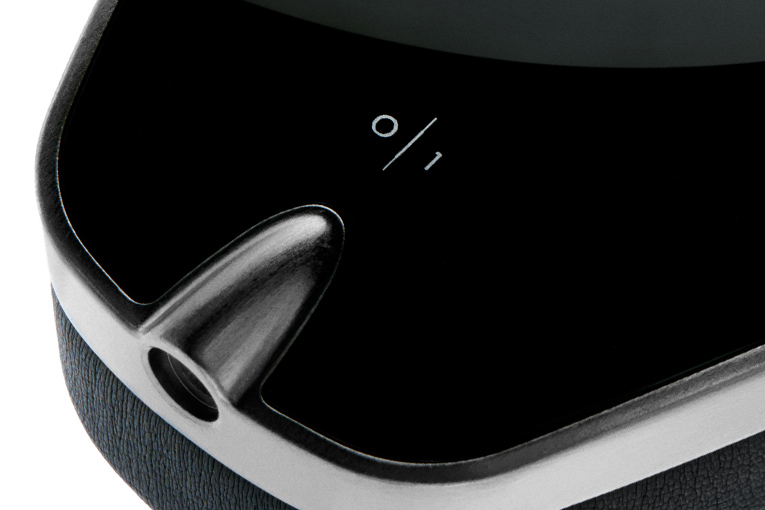
Despite the disparate materials and finishes, each of the five color combinations looks sharp. Indeed, the 0|1s are the prettiest headphones I’ve ever seen. On their Instagram account, Pryma posts pictures of beautiful people in beautiful locales, effortlessly donning pairs of 0|1s as if it were the most normal thing in the world. If NAD did something similar in ads for my reference headphones, the mostly plastic Viso HP50s, people would laugh. With the Pryma 0|1s, it works. When I stumbled across a shot of Paul Pogba -- the leggy, world-class midfielder who plays for the national soccer team of France and the Turin-based Juventus -- wearing Pryma 0|1s, I got it: Pryma couldn’t care less about appealing to audiophiles. Indeed, Pryma’s five variations on the 0|1 theme are the only headphones for sale at Barneys New York, the luxury clothing retailer. Enough said.
Technical details are few. Paulo Tezzon noted that he and his team evaluated 20 dynamic drivers before choosing one made by an unnamed Japanese firm and finished to Pryma’s specs. It has a 40mm Mylar diaphragm and neodymium magnet, and a slightly oversize voice-coil diameter relative to the diaphragm’s diameter. “The most appealing thing about this driver was its combination of transparency and sweetness,” Tezzon said. The 0|1s’ frequency range is specified as 10Hz-25kHz, the impedance as 32 ohms when fed a 1kHz signal, and the total harmonic distortion at 90dB as 0.1%. The maximum amplification is 120mW, the sensitivity 118dB/1mW/1kHz. The 0|1s measure 8”H x 7.3”W x 3”D, weigh 12.5 ounces, and include a 51” cable with a funky, circular inline mike/remote that sports but a single button.
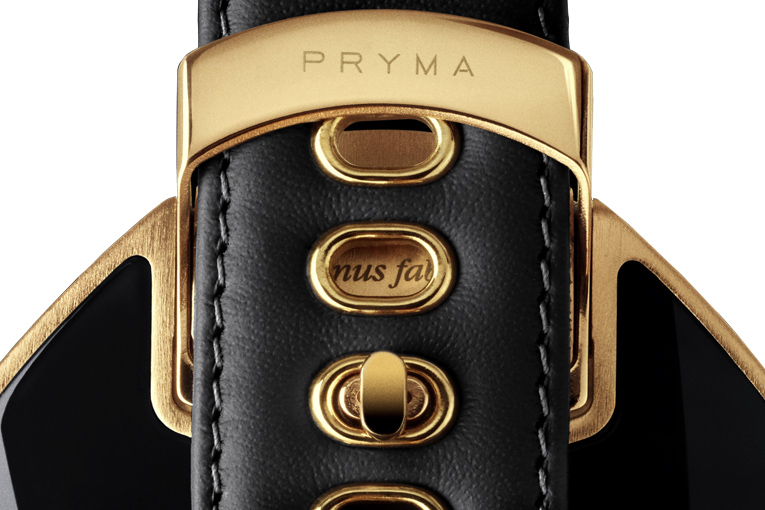
I found the Prymas definitely usable on the go; my iPhone 6 was fully up to the task of driving them cleanly and loudly, and they were comfortable to wear for listening sessions lasting a couple of hours. But they did clamp firmly around my ears -- while I often wore them for four to six hours at a stretch, I could never forget that I was wearing full-size headphones. Their size and solidity were spot on, though: Any larger, and the fashion-conscious wearer would look a bit daft. Any lighter, and the satisfying heft of a luxury product would be lost. My only gripe was with the inline remote control: Its button was a bear to find by touch alone, and was difficult to engage.
Sound
Looks aside, the Pryma 0|1s proved accomplished performers. I found their frequency response not as contoured as I’d expected from headphones designed as a “lifestyle” product. The term Technicolor came to mind: conservative dollops of saturation tactically doled out in certain ranges of the Prymas’ frequency response. The 0|1s produced a decidedly midrange-focused sound with plenty of litheness, articulation, and rhythm -- it wasn’t necessarily warm or tonally dense. Immediately noticeable was the Prymas’ midrange clarity: smooth without glossing over fine detail, and airy and effortless without sounding thin or flimsy. Their bass reproduction was virile; evidently, a couple extra dB were dialed into the low-end balance. But while the 0|1s’ bass was ripe, it was also quick and composed, not loose or indolent.
Max Richter’s fabulous “recomposition” (his word) of Vivaldi’s The Four Seasons, with solo violinist Daniel Hope and the Berlin Concert House Chamber Orchestra conducted by André de Ridder (16-bit/44.1kHz FLAC, Deutsche Grammophon), was stunning through the Prymas. In Spring 1, Hope’s violin frolics with delightful delicacy, imparting a sense of composed power that begs to be played loudly. The Prymas made the piece sound light on its feet, with an immediacy and pace that were addictive. Top-end extension was excellent: clean, clear, and unobtrusive. The transient response was tight, with the contact between bow and strings so finely drawn it bordered on sounding crisp. Yet the 0|1s’ sound was never quite edgy. While writing this, I played Spring 1 a dozen or so times, trying to hear instances of grain or etch, but failed. I did hear, again and again, loads of detail and commendable speed. Sonus Faber has struck a fine balance of midrange voicing.
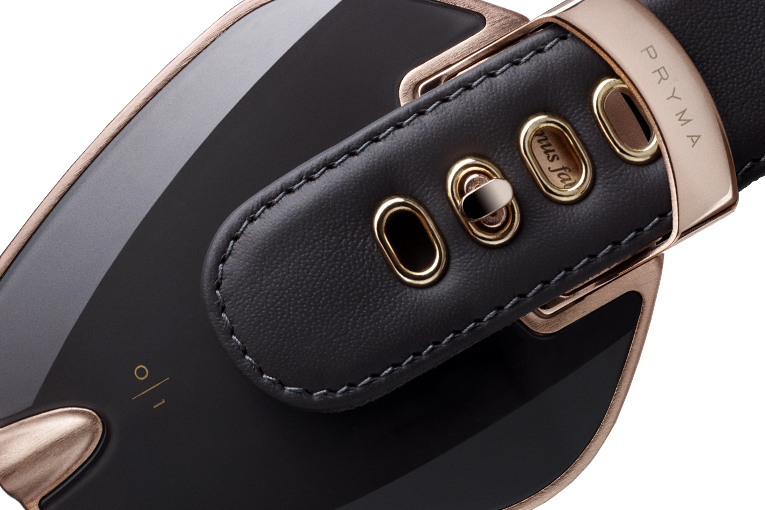
Bass-wise, the Prymas came in hard and fast. The synth-bass foundation of “Hold My Liquor,” from Kanye West’s Yeezus (16/44.1 FLAC, Def Jam), wasn’t terribly deep but had substantial impact, and the 0|1s played with authority through the midbass. Their boosted bottom end wasn’t objectionable except at very high volume levels -- something to keep in mind if your taste tends toward pop and electronic music (the latter is a favorite of mine). But I generally welcomed the extra helping of mid-upper bass. In “No Time for Caution,” from Hans Zimmer’s score for the film Interstellar (24/44.1 FLAC, WaterTower Music), the punishingly deep organ proved something of a workout for the Prymas; and while I heard substantial midbass energy, the sub-40Hz thrust I’m used to hearing from this track went missing.
“Dona Nobis Pacem,” performed by cellists Yo-Yo Ma and Kathryn Stott on Ma’s Songs of Joy & Peace (16/44.1 FLAC, Sony Classical), is notable for how it’s miked. Ma’s breathing patterns can be easily heard, with almost every inhalation audible toward the left of the soundstage. Stott, entering later, is off to the right. The recording is dense, the two cellos throwing out vigorous lower-midrange drive. The 0|1s spread them far apart, and I found it easy to focus on each player individually, or on both as a duo. The louder I played the track, the more microdetail I heard from the Prymas, and the more satisfying Ma and Stott sounded.
Comparisons
When, in 2015, I reviewed Oppo Digital’s PM-2 headphones ($699), I came away highly impressed. Their fit and finish, build quality, and tolerances were first-rate, and every bit the equal of the Pryma 0|1s’. However, the Oppos are fundamentally different animals from the Prymas. The PM-2s are heavier by an ounce, have a far more conservative design, and rely on planar drivers vented to the outside of each earcup -- not ideal for use on the go. Moreover, the Oppos have a more solid, industrial feel, despite having cushier earpads and being more comfortable to wear for longer periods. They’re nice headphones with great tactile qualities, but are not as fundamentally pretty as the Pryma 0|1s.
The Oppos’ sound is also quite different from the Prymas’. The PM-2s’ midrange is all about rich tonal shadings, velvety expressiveness, and unapologetic warmth. Moreover, the PM-2s are more neutral, with a top-to-bottom evenhandedness that is ultimately more faithful to the recording, despite its relaxed overall sound. So, too, with the Oppos’ bass, which has plenty of kick and satisfying weight, but isn’t at all boosted. Finally, the open-backed PM-2s sound slightly more spacious than did the closed-back 0|1s.
The Prymas’ midrange emphasis produced stark relief with a quick, forward, dynamic character. While their frequency response wasn’t ruler-flat, I found them more exciting and vibrant to listen to than the easygoing Oppos. Combined with their smaller, more manageable size, closed-back earcups, and fashionable design, and the Pryma 0|1s were the headphones I’d wear on the train to work, in a coffee shop, and walking down the street. I’d also appreciate the extra $150-$200 in my pocket. But as companions for long stints of work, or for listening at home after a long day, the Oppos are the more comfortable and sensible choice. Different strokes.
Conclusion
To my mind, Pryma’s 0|1 headphones have no competition. Their industrial design, high-quality materials, and luxury feel alone put them in a class of their own. They can also be customized with leather headbands of different colors to give them a fresh look. This visual and tactile feast, and the 0|1s’ exciting, dynamic sound, make Pryma’s first headphone model something of a bargain, and a no-brainer for those who want audiophile headphones that look every bit as good as they sound.
. . . Hans Wetzel
Associated Equipment
- Headphones -- Bowers & Wilkins P5 Series 2, NAD Viso HP50, Oppo Digital PM-2
- Headphone amplifiers -- Hegel Music Systems Super, Oppo Digital HA-2
- Digital sources -- Apple MacBook Pro running iTunes and Tidal; Apple iPhone 6
Pryma 0|1 Headphones
Price: $499 USD (add $50 for Carbon Marsala finish).
Warranty: Two years parts and labor.
Pryma
c/o Sumiko
2431 Fifth Street
Berkeley, CA 94710
E-mail:
Website: www.pryma.com




